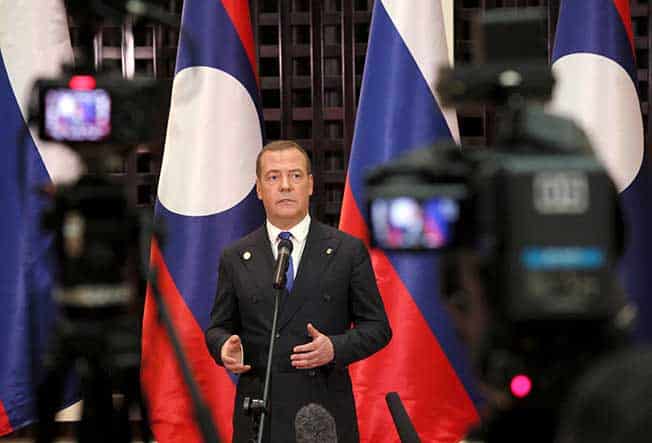A senior ally of President Vladimir Putin said on Friday the conflict in Ukraine could last for decades and that negotiations with Ukraine were impossible as long as Ukraine’s Western-backed President Volodymyr Zelenskiy was in power.
Russia’s 2022 invasion of Ukraine has triggered the deadliest European conflict since World War Two and the biggest confrontation between Moscow and the West since the 1962 Cuban Missile Crisis.
Hundreds of thousands of people have died and many more have been seriously injured in the conflict, whose roots date to 2014 after a pro-Russian president was toppled in Ukraine’s Maidan popular uprising, Russia annexed the Crimea peninsula and Russian-backed separatists seized swathes of eastern Ukraine.
“This conflict will last for a very long time. For decades, probably. This is a new reality,” Russian Security Council Deputy Chairman Dmitry Medvedev was quoted as saying by Russian news agencies.
He said Russia could not trust any truce with the current rulers of Kyiv as the conflict would simply erupt again and so the very nature of the current government of Ukraine would have to be destroyed.
Negotiations, he said, with “the clown Zelenskiy” were impossible.
“Everything always ends in negotiations, and this is inevitable, but as long as these people are in power, the situation for Russia will not change in terms of negotiations.”
Medvedev, who cast himself as a liberal moderniser when he was president from 2008-2012, now presents himself as a fiercely anti-Western Kremlin hawk. Diplomats say his views give an indication of thinking at the top levels of the Kremlin elite.
NUCLEAR WAR
Medvedev also warned that the West was seriously underestimating the risk of a nuclear war over Ukraine, cautioning that Russia would launch a pre-emptive strike if Ukraine gets nuclear weapons.
Russia, which has the world’s largest nuclear arsenal, has repeatedly accused the West of waging a proxy war with Russia over Ukraine that could mushroom into a much bigger conflict.
“There are irreversible laws of war. If it comes to nuclear weapons, there will have to be a pre-emptive strike,” Medvedev said.
Allowing Ukraine nuclear weapons – a step no Western state has publicly proposed – would mean “a missile with a nuclear charge coming to them”, Medvedev was quoted as saying.
“The Anglo-Saxons do not fully realise this and believe that it will not come to this. It will under certain conditions.”
The West says it wants to help Ukraine win its conflict with Russia, and Western powers have supplied large amounts of modern arms and ammunition to Kyiv. But U.S. President Joe Biden has cautioned that a direct confrontation between the U.S.-backed NATO alliance and Russia would result in World War Three.
Russia says Washington would never allow it to arm a country bordering the United States, and the Kremlin says the West is already essentially fighting an undeclared war with Russia.
When Ukraine gained independence after the 1991 break-up of the Soviet Union, it hosted thousands of nuclear weapons. It handed these to Russia under the 1994 Budapest Memorandum, in return for guarantees of its security and sovereignty from Russia, the United States and Britain.







Click here to change your cookie preferences